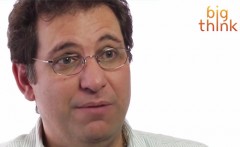 At the time of his arrest in 1995, Kevin Mitnick was the most wanted cyber criminal in the United States. The arrest marked the end of an intense two-and-a-half-year electronic manhunt, a game of cat and mouse that Mitnick likens to a video game.
At the time of his arrest in 1995, Kevin Mitnick was the most wanted cyber criminal in the United States. The arrest marked the end of an intense two-and-a-half-year electronic manhunt, a game of cat and mouse that Mitnick likens to a video game.
“I was a little bit insane,” Mitnick admits. “Why I did this psychologically is I loved putting myself in dangerous situations and then trying to work my way out of them.”
To evade the FBI, Mitnick meticulously developed cover stories for himself. He worked in a law firm in Denver and a hospital in Seattle. “I was so into creating my cover it was almost like I was living another life,” he says.
This fantasy life was inspired by Hollywood. According to the Tsutomo Shimomura’s book Takedown, “Early on, after seeing the 1975 Robert Redford movie Three Days of the Condor, [Mitnick] had adopted Condor as his nom de guerre. In the film Redford plays the role of a hunted CIA researcher who uses his experience as an Army signal corpsman to manipulate the phone system and avoid capture. Mitnick seemed to view himself as the same kind of daring man on the run from the law.”
Mitnik’s ability to evade the authorities earned him considerable notoriety. He tells Big Think the story of how he toyed with the FBI when he figured out they were close to catching him.
Transcript —
When the government was chasing me I wanted to get a sense of how close they were and to me this was a game. It was kind of like I was a little bit insane and I treated my fugitive status as a big video game. Unfortunately, it had real consequences and why I did this psychologically is I loved putting myself in dangerous situations and then trying to work my way out of them. I don’t know why I liked doing this, but I did. So what I did is I hacked into the cellular provider in Los Angeles that serviced the FBI cell phone numbers of the agents that were chasing me, so to make a long story short I was able to get the cell phone numbers of the agents and then by hacking into the cellular provider I could monitor where they physically were, physically in Los Angeles. I could also monitor who they were calling and who was calling them.
So based on my traffic analysis and my location data I was able to find out if the feds ever got close and one time they did. I had an early warning system set up in 1992 when I was working as a private investigator in Los Angeles and when the warning system was tripped off I found out that the FBI was actually at my apartment and I was a mile away in Calabasas, but I just drove in from the apartment to work, so obviously they weren’t there to arrest me and I didn’t think if they were still near my apartment that it was to surveil me, so the only logical thing is that they were there to conduct a search and that means to get a search warrant. They didn’t have a search warrant yet.
So in every criminal case when they have to get a search warrant from a judge they have to write down the precise description of the premises to be searched. It’s the Fourth Amendment stuff and so I figured out that that was going on and so the very next day I cleaned up—well that evening I cleaned up everything from my apartment that the FBI may be interested in and then the very next day went out to Winchell’s Donuts and got a big dozen assorted donuts and I labeled the box “FBI donuts” and I put it in the refrigerator. So when they were going to come search the only thing they would find is I had some donuts for them.
They searched the next day. They didn’t’ find anything. I don’t even know if they opened the refrigerator, but if they did they didn’t help themselves to a donut for some reason. I don’t know why.
Directed / Produced by Jonathan Fowler, Elizabeth Rodd, and Dillon Fitton

You must be logged in to post a comment Login